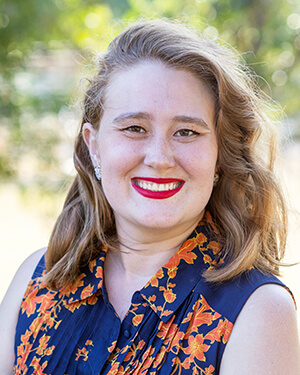Kiana Rathjens, Doctoral Intern

Kiana Rathjens, MS
Doctoral Intern
Supervised by: Aaron Dembe, PhD
Not Accepting New Patients
Hi! My name is Kiana.
My name is Kiana Rathjens and I am a therapist and doctoral intern here at Deep Eddy Psychotherapy. I’d like to briefly introduce myself and give an overview of my therapeutic style so that you may make a more informed decision about finding a therapist. More often than not, therapy is dependent upon the relationship that develops between the therapist and the client so I hope we can get to know each other soon and determine if we are a good fit for treatment.
Things I can help with:
- Depression and mood issues
- Anxiety and excessive worrying
- Processing of grief and loss
- Trauma, PTSD, and C-PTSD symptoms
- Disordered eating, self-image concerns, and weight stigma
- Chronic illness, living with disability, and self-advocacy
- LGBTQIA+ specific issues
- “Meaning-making”, mindfulness, and insight development
- Identity clarification, individuation, and self-esteem
- Relationship concerns, breakups, and separations
- Personal spiritual development
- Performance, creativity, and the arts
- Distress tolerance, interpersonal effectiveness, and emotion regulation
My therapeutic style:
I tend to utilize a psychodynamic orientation, which means that I use a framework that proposes that, over time, we are made up of all the stories that we tell ourselves; from our interplay with others across relationships, to how we react to the world at large, and to what we believe about ourselves without awareness.
Therefore, therapy becomes a means of translating and understanding these narratives and then empowering individuals to realize that such stories are not necessarily set in stone. In fact, the more insight one gains over time, the more conscious one is of their patterns of thoughts and actions which in turn increase the likelihood of gaining a more holistic/realistic understanding of oneself.
With all of this in mind, I tend to approach the actual process of therapy from a humanistic and existential perspective-particularly emphasizing that each individual is the expert of their own life and that with shared vulnerability and empathy, the therapist and client can better understand the latter’s reality and work to change what they may have control over. I have also learned that to “do good therapy”, different skills and tools are to be used as needed as treatment should be a collaborative process that is shaped over time. Thus, I aim to use different treatment modalities within my clinical toolkit when applicable to a case such as using components of CBT, DBT, and other trauma-informed modalities such as CPT and CTT too. Ultimately however, I always come back to the idea that regardless of modality, orientation, or perspective, “good therapy” exists as an art/science of active empathy while using techniques that have been peer-reviewed and empirically supported.
About me:
As a native Floridian, I am quite accustomed to the southern heatwave but I am sure the absence of humidity in Texas will be a wholly new experience for myself! 🙂
Regardless of any arid trepidation however, I chose Deep Eddy as my ideal internship as I have been looking forward to leaving my comfort zone in Florida, I was struck with how Deep Eddy’s practice philosophy resonated with my own values, and I knew that I would be set up for success in an outpatient setting as I have had quite a bit of experience working within such centers so far.
I received my BS in Clinical Psychology from the University of Florida (Go Gators!) and my MS in Clinical Psychology from Nova Southeastern University. Currently, I am still enrolled at the latter as a doctoral candidate and have had much of my clinical experience at community-based mental health centers specifically working with trauma, anxiety, mood disorders, and personality concerns while utilizing a psychodynamic and eclectic approach. I have also conducted some literary research during my academic career in which I sought to articulate the therapeutic factors at play when utilizing art therapy for traumatized populations. This was of notable interest to me from a personal perspective as I have always believed in the therapeutic nature of art, and I was invested in objectively describing its’ potential for clinical impact.
On an entirely different note, outside of my clinical interests and academic pursuits, I am an avid bookworm, an amateur artist, and passionate consumer of Disney movies, Star Trek, iced coffee, and vintage design. I also love to swing dance, bike, journal, thrift, and cook in my free time and I have been known to revel in a sunny afternoon nap when I can manage it too.
That’s enough about me for now, but I hope to get to know you real soon and please know that you are welcome to reach out at any time with any further questions.
LLAP & DFTBA
